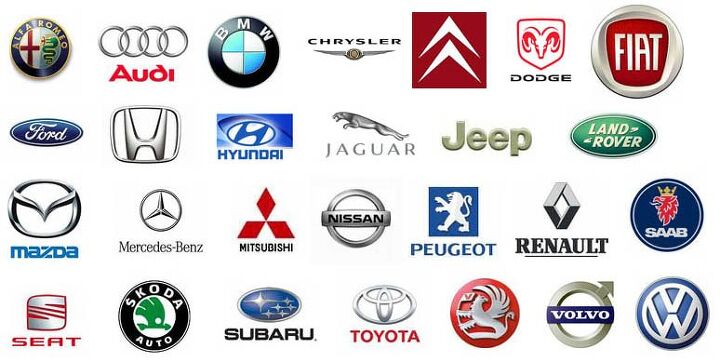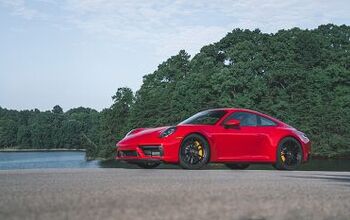Soon, Anything Goes At Europe's Car Dealers

In 2003, when I had a different (and much better paying) job, I wrote for the umpteenth time: “This law makes Europe the most liberal car market in the world, more liberal than the freewheeling U.S. car market.” Of course I was cheating a bit, because as we all know, the U.S. car market is anything but freewheeling. “This law” was the Block Exemption Regulation, BER for short. It allowed any EU dealer to sell any car, allowed non-branded parts in branded dealerships, and allowed any workshop to perform warranty repairs on your car. That came with a big IF: IF the new car dealer complied with the standards set by the brand and IF the workshop complied with the service standards of the brand. Even these last vestiges are now going away, turning the supposedly socialist Europe into a land of unbridled car capitalism.
When the BER came in effect in 2003, it had a sunset period until 2010, when the only controlling forces would be supply and demand. After serious lobbying, the period had been extended until 2013. This will be it, however. After 2013, anyone can truly sell and service anything. The standards had kept the dealers in line and prevented supermarkets from selling cars. The specter of “supermarkets selling cars” had been successfully used to enact the BER in the first place, and to extend it for a few years longer.
What the BER did was spawn big multibrand franchises. Automotive News [sub] cites a dealer Luxembourg, Autopolis, which has 12 brands under one roof. Tricky dealers secured one or two new car franchises by complying with the tough and expensive new car standards. Then they applied for service contracts from other brands by complying with much laxer and less expensive service standards. This allowed dealers to put logos up, and they could happily sell and service the cars, because no outsider would know the difference between a full and a service only dealer.
Now, says Automotive News , “dealer executives warn that the ending of the auto industry’s exemption – or “safe harbor” from EU competition rules – will give automakers even more influence on new car sales than they already have. In particular, automakers will seek to reverse the trend toward dealers selling multiple brands from different manufacturers in single showrooms, dealers fear.”
This of course is utter bunk. In the future, cars will fall under the same competition rules in Europe as washing machines. Manufacturers had fought the BER with teeth and nails. They successfully lobbied for an extension. Now, manufacturers will lose the whip of expensive standards. Manufacturers and dealers can agree on a code of conduct, but the code may not violate tough European competition laws.
What dealers should fear is disintermediation. Large automakers in Europe have quietly bought up large dealers when they got into trouble. When Volkswagen bought Porsche Holding Salzburg, they didn’t buy Porsche as many assumed, but the sole Austrian importer of all things Volkswagen, and one of the largest car dealer groups in Europe. This was already legal since 2003, but now, all bets and gloves are off. If automaker can’t control dealers anymore, they will create their own distribution channels.
Speaking of Porsche, the real Porsche just cancelled all dealer contracts in Europe with 24 months notice. June plus 24 months equals June 2013.

Bertel Schmitt comes back to journalism after taking a 35 year break in advertising and marketing. He ran and owned advertising agencies in Duesseldorf, Germany, and New York City. Volkswagen A.G. was Bertel's most important corporate account. Schmitt's advertising and marketing career touched many corners of the industry with a special focus on automotive products and services. Since 2004, he lives in Japan and China with his wife <a href="http://www.tomokoandbertel.com"> Tomoko </a>. Bertel Schmitt is a founding board member of the <a href="http://www.offshoresuperseries.com"> Offshore Super Series </a>, an American offshore powerboat racing organization. He is co-owner of the racing team Typhoon.
More by Bertel Schmitt
Latest Car Reviews
Read moreLatest Product Reviews
Read moreRecent Comments
- 3-On-The-Tree Lou_BCone of many cars I sold when I got commissioned into the army. 1964 Dodge D100 with slant six and 3 on the tree, 1973 Plymouth Duster with slant six, 1974 dodge dart custom with a 318. 1990 Bronco 5.0 which was our snowboard rig for Wa state and Whistler/Blackcomb BC. Now :my trail rigs are a 1985 Toyota FJ60 Land cruiser and 86 Suzuki Samurai.
- RHD They are going to crash and burn like Country Garden and Evergrande (the Chinese property behemoths) if they don't fix their problems post-haste.
- Golden2husky The biggest hurdle for us would be the lack of a good charging network for road tripping as we are at the point in our lives that we will be traveling quite a bit. I'd rather pay more for longer range so the cheaper models would probably not make the cut. Improve the charging infrastructure and I'm certainly going to give one a try. This is more important that a lowish entry price IMHO.
- Add Lightness I have nothing against paying more to get quality (think Toyota vs Chryco) but hate all the silly, non-mandated 'stuff' that automakers load onto cars based on what non-gearhead focus groups tell them they need to have in a car. I blame focus groups for automatic everything and double drivetrains (AWD) that really never gets used 98% of the time. The other 2% of the time, one goes looking for a place to need it to rationanalize the purchase.
- Ger65691276 I would never buy an electric car never in my lifetime I will gas is my way of going electric is not green email


































Comments
Join the conversation
Not only Porsche has cancelled all dealer contracts: So has LandRover, Jaguar, Peugeot (Second biggest car maker in Europe!), Citroen, Suzuki...others, like Opel or Toyota have "changed" dealer contracts "in compliance" with the dealer ("If you don't give us what you want, in 2013 you're no longer a dealership!") Volkswagen is really sneaky in these things. Not only have they bought the Porsche Holding (btw which was formerly owned 50% by the Porsche family and 50% by the Piech family and not only important in little Austria but also the major import company for all VW-Company cars in all of Eastern Europe and parts of Southern Germany) but also e.g. MAHAG Munich. MAHAG was a huge dealership (some 30 dealerships) in the Munich area and...nobody would say this openly, but Volkswagen let them go down. MAHAG had gotten in some big trouble with the value of returned leasing cars from AUDI, VW, Skoda and Seat. Even though they based their value estimation on what VW told them in their computer systems, they lost several thousand dollars on every car returned. (My English is not all that great; for a better understanding: You lease a MSRP 30.000 € AUDI, pay 10.000 € in leasing payments in 3 years (since this is what the computer told the sales person at the dealership) and after that period return it to the dealer. Well, the car should be worth 20.000 € for the dealer to make money, right? Well in most cases it wasn't even worth 15.000 €. Now multiply this with 1.000 cars that are being leased to customers in big dealerships like MAHAG and there you are: 5.000.000 € in value gone.) Volkswagen wouldn't help, but rather "rescue" the company - through buying it. Poor them. There are several examples of this in Germany...the very low value of returned leasing cars compared to what the lease taker had paid for a car killed many dealerships. Those who always hailed VW got rescued. The others "died" or - if big and profitable enough - where bought by VW... Now, in what way is this an "open" marked ;)
"Of course I was cheating a bit, because as we all know, the U.S. car market is anything but freewheeling." What's not freewheeling about it?